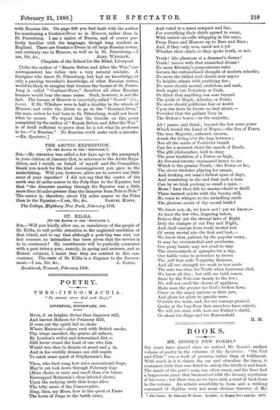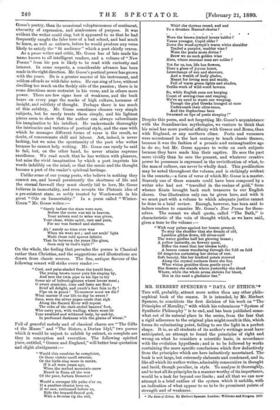BOOKS.
MR. GOSSE'S NEW POEMS.*
Six years have passed since we noticed Mr. Gorse's earliest volume of poetry in the columns of the Spectator. "On Viol and Flute" was a work of promise, rather than of fulfilment. With much in it to charm the ear and stimulate the fancy, it contained little that was fitted to satisfy the intellect and heart. The music of the poet's song was often sweet, and his lines had a languorous grace that harmonised with the dreamy mysticism of his verse; but there was, as we have said, a want of back-bone in the volume. An artistic sensibility to form and a striking command of rhythm were not more obvious features of Mr.
• New Poems. By Edmund W. Gone. London ; 0. Kagan Paul and 00. 1879.
Gosse's poetry, than its occasional voluptuousness of sentiment, obscurity of expression, and aimlessness of purpose. It was evident the writer could sing, but it appeared to us that he had frequently caught the false tone of a bad school, and had much
to learn, as well as unlearn, before he would produce any verse likely to satisfy the "fit audience" which a poet chiefly craves.
As a prose writer and critic, Mr. Gosse has of late made his name known to all intelligent readers, and a volume of "New Poems" from his pen is likely to be read with curiosity and interest. In some respects, a considerable advance has been made in the right direction. Mr. Gorse's poetical power has grown with the years. He is a greater master of his instrument, and seldom offends us with false notes. He can sing of love, without dwelling too much on the fleshly side of the passion ; there is in some directions more restraint in his verse, and in others more power. There are few signs here of weakness, and the book bears on every page the marks of high culture, keenness of insight, and subtlety of thought. Perhaps there is too much of this subtlety, Mr. Goose sometimes chooses very simple subjects, but he rarely treats them simply, and his lightest pieces seem to show that the author can always subordinate his imagination to his intellect. He understands thoroughly the intricacies and varieties of poetical style, and the ease with which be manages different forms of verse is the result, no doubt, of consummate skill and labour. Art, indeed, is never lacking, but we miss the spontaneity of the poet who writes because he cannot help writing. Mr. Gosse can rarely be said to fail, but, on the other hand, he never attains supreme excellence. We read much that he has written with pleasure, but miss the vivid imagination by which a poet imprints his words indelibly on the mind, so that the music and the thought become a part of the reader's spiritual heritage.
Unlike some of our young poets, who believe in nothing they cannot see, and bewail persistently the shortness of life and the eternal farewell they must shortly bid to love, Mr. Gosse believes in immortality, and even accepts the Platonic idea of a pre-existent state, so nobly treated by Wordsworth in his great "Ode on Immortality." In a poem called " Winter- Green " Mr. Gosse writes :—
"Surely before the stars were sure, Before the moon was set in heaven, Your unborn soul to mine was given,
Your clear, white spirit, rare and pure, For me was formed and shriven.
Ah ! surely no time ever was
When we were not ; and our souls' light
Made those cold spaces infinite That lie between the years like glass, Seen only in God's sight !"
On the whole, the feeling that pervades the poems is Classical rather than Christian, and the suggestions and illustrations are drawn from classic sources. The fine, antique flavour of the following sonnet will strike every reader :—
"Cool, and palm-shaded from the torrid heat,
The young brown tenor puts his singing by, And sets the twin pipe to his lips to try Some air of bulrush-glooms where lovers meet ;
0 swaxt musician, time and fame are fleet ;
Brief all delight, and youth's feet fain to fly !
Pipe on in peace ! To-morrow must we die ?
What matter if our life to-day be sweet ?
Soon, soon the silver paper-reeds that sigh Along the Sacred River will repeat The echo of the dark-stoled bearers' feet, Who carry yon, with wailing, where must lie Your swathed and withered body, by-and-by, In perfumed darkness with the grains of wheat."
Full of graceful melody and of classical charm are "The Gifts of the Muses" and "The Sisters, a Dorian Idyl," two poems which it would be unjust to exhibit by extract, so complete are they in conception and execution. The following spirited piece, entitled," Greece and England," will better bear quotation and slight abridgment :—
" Would this sunshine be completer, Or these violets smell sweeter, Or the birds sing more in metre,
If it all were years ago, When the melted mountain-snow Heard in Enna, all the woe Of the poor, forlorn Demeter ?
Would a stronger life pulse o'er us, If a panther-chariot bore us,
If we saw, enthroned before us, Ride the leopard-footed god,
With a fir-cone tip the rod,
Whirl the thyrsns round, and nod To a drunken Maenad-chorus?
------- Were the brown-limbed lovers bolder ?
Venus younger, Cupid older ?
Down the wood-nymph's warm white shoulder
Trailed a pnrpler, madder vine ?
Were the poets more divine ?
Brew we no such golden wine Here, where summer suns are colder ?
Yet for us, too, life has flowers, Time a glass of joyous hours, Interchange of sun and showers, And a wealth of leafy glades, Meant for loving men and maids, Full of warm green lights and shades, Trellis-work of wild-wood bowers.
So, while English suns are keeping Count of sowing-time and reaping, We've no need to waste our weeping, Though the glad Greeks lounged at ease Underneath their oli,ve-trees, And the Sophoclean bees Swarmed on lips of poets sleeping !"
Despite this poem, and not forgetting Mr. Gorse's acquaintance. with the Scandinavian mythologies, we venture to think that his mind has more poetical affinity with Greece and Rome, than with England, or any northern chine. Poets and versemen were accustomed in the last century to touch classic themes, because it was the fashion of a prosaic and unimaginative age to do so; but Mr. Gosse appears to write on such subjects because they have made him their captive. He sees the past more vividly than he sees the present, and whatever creative Dower he possesses is expressed in the revivification of what, to- the man of culture, can never be wholly dead. This predilection may be noted throughout the volume, and is strikingly evident in the sonnets,—a form of verse of which Mr. Gosse is a master. Scarcely one of these sonnets could have been composed by a writer who had not "travelled in the realms of gold," from whence Keats brought back such treasures to our English shores. One illustration only can be given here, and with it we must part with a volume to which adequate justice cannot be done in a brief review. Enough, however, has been said to induce readers to examine Mr. Gorse's New Poems for them- selves. The sonnet we shall quote, called "The Bath," is characteristic of the vein of thought which, as we have said, gives a tone to the volume :—
"With rosy palms against her bosom pressed,
To stay the shudder that she dreads of old, Lysidice glides down, till silver-cold The water girdles half her glowing breast ; A yellow butterfly, on flowery quest, Rifles the roses that her tresses hold ; A breeze comes wandering through the fold on fold Of draperies curtaining her shrine of rest.
Soft beauty, like her kindred petals strewed Along the crystal coolness there she lies.
What vision gratifies those gentle eyes ?
She dreams she stands where yesterday she stood
Where, while the whole arena shrieks for blood,
Hot in the sand a gladiator lies."



































 Previous page
Previous page